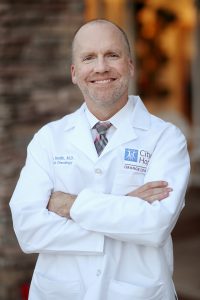
By Dr. Wade Smith, Medical Oncologist at City of Hope Newport Beach
What should you ask at your first cancer appointment?
If you have been newly diagnosed with cancer, it’s natural to experience a range of emotions, and it’s normal to feel overwhelmed at first. Take the time to process the news, develop an action plan, and mobilize a strong support system of family or friends.
A good place to start is making a list of questions for your medical oncologist. Seeing a medical oncologist — a highly trained physician with specialized expertise in treating cancer — is usually one of the first steps of a patient’s journey with cancer.
Write the questions down. But don’t worry about forgetting something you wanted to ask or having more questions come to mind after leaving the doctor’s office.
Having a close family member diagnosed with breast cancer brought home the fact that patients have questions and concerns, but they don’t always include these questions on the list they bring to the doctor’s office. Knowing that, it’s incumbent on the doctor to have an in-depth conversation with the patient and care partner so that everyone receives important information. Making that connection at the very beginning of the cancer journey is one of the most important aspects of my job as a City of Hope physician.
Here are several of the questions I recommend asking at your first cancer appointment. If you can, write down the answers and take notes, or record your visit if they allow it. It’s always a good idea to have a friend listen in – even if it’s by phone – to take notes for you and provide support.
Q: How much experience do you have treating this type of cancer?
Your first shot against cancer should be your best shot. Before starting treatment, speak with an expert who has a depth of experience treating your specific type of cancer and access to advanced treatments and clinical trials.
Q: Should I get a second opinion?
A second opinion from a specialized expert can help provide you peace of mind that you fully understand your cancer diagnosis and every available treatment option. There are many types of cancer, and a specialist in your type may spot nuances that other physicians might not see and have more knowledge of advances in research and treatment that may benefit you. The best time to seek a second opinion is before treatment starts.
Q: What are the risks and benefits of my treatment options?
Some patients with cancer will only need one form of treatment. Others may need a blended approach utilizing a combination of therapies that may include chemotherapy, radiation therapy, targeted drug therapy, immunotherapy, hormone therapy, surgery, or other treatments. Ask your oncologist whether you will have more than one type of treatment and how each is expected to help you.
Q: What can I do to manage potential side effects of treatment?
Cancer treatment is personalized for each patient, but so are the side effects. Speak with your oncologist about what to expect and steps to effectively deal with potential side effects.
Q: Will treatment affect my ability to perform work or other daily activities?
Some people work through treatment without any changes, and some people may need special accommodations or a less demanding schedule. The key is finding what works best for you under the circumstances and adapting to your needs if they change.
Q: Are there any clinical trials that may be right for me?
Your oncologist may suggest participating in a clinical trial. Typically, clinical trials study a promising new drug or treatment that is on the path to FDA approval. Patients participating in clinical trials have access to these leading-edge therapies before they are widely available.
Q: What questions would you ask if you were me?
Good communication with your oncologist, including asking and answering questions, will help you manage your treatment.
Visit https://www.cityofhope.org/locations/newport-beach-fashion-island.
